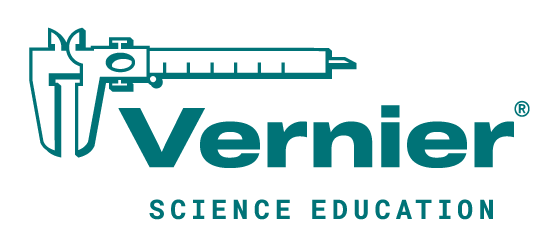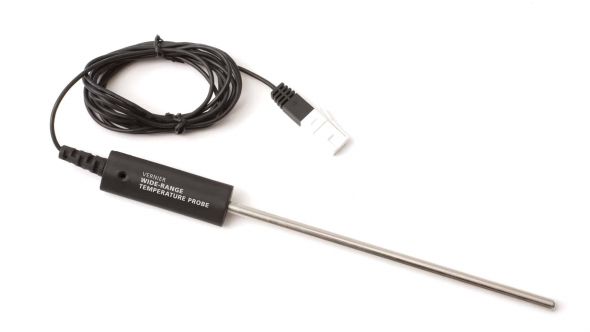Wide-Range Temperature Probe User Manual
Order Code: WRT-BTA
This rugged temperature probe features a wide temperature range, from –20 to 330°C. The high upper limit of the sensor allows for melting point determinations of most organic compounds. It uses RTD (Resistance Temperature Detection) technology to establish a ±0.5°C accuracy, as well as excellent stability and repeatability. Each unit is individually calibrated, and the calibration is stored on the sensor. It is designed to be used as you would use a thermometer for experiments in organic and inorganic chemistry, physics, biology, Earth science, and environmental science.
Note: Vernier products are designed for educational use. Our products are not designed nor are they recommended for any industrial, medical, or commercial process such as life support, patient diagnosis, control of a manufacturing process, or industrial testing of any kind.
Compatible Software and Interfaces
Choose a platform below to see its compatibility requirements.LabQuest
Interface LabQuest App LabQuest 3 Full support LabQuest 2 Full support LabQuest Full support Computers
Software Interface Graphical Analysis Graphical Analysis (Web App) Logger Pro (discontinued) Logger Lite (discontinued) LabQuest Mini Full support Full support Full support Full support LabQuest 3 Full support Full support Full support Incompatible LabQuest 2 Full support Full support Full support Full support LabQuest Stream Full support 1 Full support 1 Partial support 2 Full support 1 Go!Link Full support Full support Full support Full support LabQuest Full support Full support Full support Full support LabPro Incompatible Incompatible Full support Full support Compatibility Notes
Chromebook
Software Interface Graphical Analysis (Web App) LabQuest Mini Full support LabQuest 3 Full support LabQuest 2 Full support LabQuest Stream Full support 1 Go!Link Full support LabQuest Full support Compatibility Notes
iOS
Software Interface Graphical Analysis Graphical Analysis GW LabQuest Stream Full support Full support LabQuest 3 Full support 1 Full support 1 LabQuest 2 Full support 1 Full support 1 Compatibility Notes
Android
Software Interface Graphical Analysis Graphical Analysis GW LabQuest Stream Full support Incompatible LabQuest 3 Full support 1 Full support 1 LabQuest 2 Full support 1 Full support 1 Compatibility Notes
Arduino
Software Interface Arduino Vernier Arduino® Interface Shield Full support 1 Compatibility Notes
LabVIEW
Software Interface NI LabVIEW SensorDAQ Full support Vernier myDAQ Adapter Full support 1 2 Go!Link Full support 2 LabQuest Mini Full support LabQuest Stream Full support LabQuest 3 Full support LabQuest 2 Full support LabQuest Full support Compatibility Notes
Texas Instruments
Software Interface EasyData TI-84 SmartView DataQuest TI-Nspire Software EasyLink Full support 1 Full support 2 Full support Full support 2 CBL 2 Full support 3 Incompatible Incompatible Incompatible LabPro Full support 3 Incompatible Incompatible Incompatible TI-Nspire Lab Cradle Incompatible Incompatible Full support Full support Compatibility Notes
Quick Start
- Plug the sensor into the interface (LabQuest 3, LabQuest Mini, etc.).
- Connect the interface to your device.
- If using USB, connect to the USB port on your computer.
- If using Bluetooth® wireless technology, click your interface type and then select your device.
- Prepare for data collection:
- Vernier Graphical Analysis®: Launch the app, if necessary, and click Sensor Data Collection.
- LabQuest® App: Choose New from the File menu.
The software will identify the sensor and load a default data-collection setup. You are now ready to collect data.
Need Additional Information?
Visit the following link:
Using the Product
Connect the sensor following the steps in the Quick Start section of this user manual.
Important: When using this sensor, keep in mind that important electronic circuitry is built into the handle of the probe. For optimal accuracy of the RTD, keep the handle of the probe from warming above 40°C (104°F). If necessary, shield the handle from high-temperature sources using aluminum foil or other shielding material.
Videos
There are no videos for this product.
Calibration
The Wide-Range Temperature Probe will never need to be calibrated. Each probe is carefully calibrated before it ships, and this unique calibration is stored on the sensor.
Specifications
|
Temperature range |
–20 to 330°C |
|
Maximum temperature that the sensor can tolerate without damage |
380°C |
|
Resolution |
0.12°C |
|
Temperature sensing element |
Platinum RTD (100 Ω) |
|
Accuracy |
±0.5°C or better |
|
Response time from 25 to 100°C in water |
30 seconds |
|
Probe dimensions |
|
Care and Maintenance
Probe Chemical Tolerance: The stainless-steel probe body is constructed from grade 316 stainless steel. This high-grade stainless steel provides a high level of corrosion resistance for use in the science laboratory. Here are some general guidelines for usage:
- The probe handle is constructed of molded plasticized Santoprene®. While this material is very chemical resistant, we recommend that you avoid submerging the probe beyond the stainless steel portion.
- Always wash the probe thoroughly after use.
- The probe can be left continuously in water at temperatures within the range of –20°C to 330°C. Continuous usage in saltwater will cause only minor discoloration of the probe, with no negative effect on performance.
- You can leave the probe continuously in most organic compounds, such as methanol, ethanol, 1-propanol, 2 propanol, 1-butanol, n-hexane, lauric acid, paradichlorobenzene, phenyl salicylate, and benzoic acid. The probe should not be left in n-pentane for more than one hour.
- The probe can be left in strong basic solutions, such as NaOH, for up to 48 hours, with only minor discoloration. We do not recommend usage in basic solutions that are greater than 3 M in concentration.
- Do not wrap the cable tightly around the sensor for storage. Repeatedly doing so can irreparably damage the wires and is not covered under warranty.
-
The chart below provides the maximum length of time we recommend for probe exposure to some common acids. Probes left in an acid longer than these times may bubble and/or discolor, but will still be functional. We do not recommend probes be left to soak in any acid longer than 48 hours.
| Maximum acid exposure time | |
|---|---|
|
1 M HCl |
20 min |
|
2 M HCl |
10 min |
|
3 M HCl |
5 min |
|
1 M H2SO4 |
48 hours |
|
2 M H2SO4 |
20 min |
|
3 M H2SO4 |
10 min |
How the Sensor Works
The detector is an RTD (Resistance Temperature Detection) sensor with an output that increases nonlinearly with increasing temperature. The best-fit approximation to this nonlinear characteristic is a quadratic equation:
T = K0 + K1*V + K2*V2
where T is temperature (°C), K0 = ~ –33.8, K1 = ~73.2, and K2 = ~0.90. During the Vernier custom calibration, these values are adjusted slightly to achieve a ±0.3°C accuracy value at 100°C. The data acquisition programs convert V to temperature in units of °C (default), K, or °F.
Troubleshooting
For troubleshooting and FAQs, see www.vernier.com/til/1987
Repair Information
If you have watched the related product video(s), followed the troubleshooting steps, and are still having trouble with your Wide-Range Temperature Probe, contact Vernier Technical Support at support@vernier.com or call 888-837-6437. Support specialists will work with you to determine if the unit needs to be sent in for repair. At that time, a Return Merchandise Authorization (RMA) number will be issued and instructions will be communicated on how to return the unit for repair.
Warranty
Warranty information for this product can be found on the Support tab at www.vernier.com/wrt-bta/#support
General warranty information can be found at www.vernier.com/warranty
Contact Support
Fill out our online support form or call us toll-free at 1-888-837-6437.

